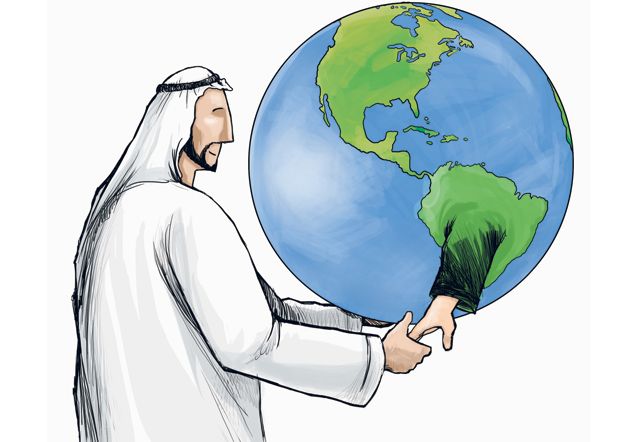His tour of Latin America took him to more than eight countries in two weeks and was a substantial commitment to the UAE opening up new and closer ties with the whole of the continent.
For most of history, relations between the Arab Gulf and Latin America have been very slight and neither region impinged on the other at all. But this has been rapidly changing in the past few years. Like any other region of the world, the Arab Gulf can no longer operate by talking just to its immediate neighbours and the few global powers. The emerging linked-up world needs all regions of the globe to talk to each other directly and without the intermediation of Washington or Moscow. The global issues of the Twenty-First Century cover a far wider spectrum than coping with great power rivalry and they include finding a better way towards managing the world's economies under the leadership of the G20, promoting sustainable energy and arresting global warming, stopping drug smuggling and human trafficking and working towards the implementation of the many important social values defined in the UN's Millennium Development Goals.
Shaikh Abdullah's trip to so many countries took the important message to Latin America that the UAE cares about the region and wants to be in touch and that the UAE knows that the new interlinked world requires the different parts of the world to be in direct contact with each other.
It was significant that Shaikh Abdullah spent a lot of time in both Brazil and Mexico, the two giants of Latin America (Brazil is already listed as one of the world's leading economies). His trip also included Argentina, Colombia, Peru, Panama, Nicaragua and the Dominican Republic, as well as Cuba — the last surviving Communist Latin American state, where he delivered much the same message as to the others of looking for closer cooperation and better understanding of each side's mutual concerns.
In many of these countries, Shaikh Abdullah thanked the Latin American governments for their support for the UAE's successful bid to host the International Renewable Energy Authority, Irena. This was the first time that a major UN agency was based outside Europe or North America and the UAE mounted a substantial diplomatic effort to muster support for its bid, emphasising that as an oil-producing state, the UAE has a particular interest and set of energy skills available locally in developing more sustainable sources of energy. It was a first time for the UAE that its diplomats went to so many UN member states to lobby them for a vote and the Foreign Minister's personal thanks to the governments would have been a very well received gesture.
This allowed Shaikh Abdullah to start his visits with a specific message, offering thanks for helping create a success, which is always a good way to break the ice with a new friend. After this he could then move on developing some practical steps to improve relations, which in almost every one of these countries was recognising that trade and business relations needed to be put on a more secure footing. As a result, the communiqués from each country spoke how to put in place the basic agreements that allow free and easy trade of goods and services, like signing double taxation treaties, implementing agreements to protect trade and enforcing investment protection.
In addition, the Foreign Minister and his hosts spoke of business growth in several areas like agriculture (and the UAE like all the Gulf states is a large importer of food) and tourism (going both ways).
In addition, they all spoke of their mutual interest in energy (perfectly normal when talking with one of the world's largest exporters of hydrocarbons), but what was remarkable was the Latin American interest in talking with the UAE about renewable energy. This shows that Abu Dhabi is preparing to offer the knowledge it will learn from its several initiatives, like its peaceful nuclear programme with the third party supply of enriched fuel and new technologies it will develop from Masdar. Both the nuclear programme and Masdar are putting Abu Dhabi in the forefront of the search for renewable energy and it is good to see Shaikh Abdullah showcasing these important new skills.
Longer term, the Latin states and the Arab states have a lot to talk about. They are both fast growing areas with huge potential and both regions are very aware that the next decade will need to see them to be in much closer contact. They will be meeting in a wide variety of forums, seeking common ground on issues as varied as climate change, reform of the UN and IMF, implanting free trade agreements through the World Trade Organisation, or even dealing with organised crime like drugs or human trafficking.
The Foreign Minister's tour of Latin America was the optimistic start of a very long and important process of growing together.









